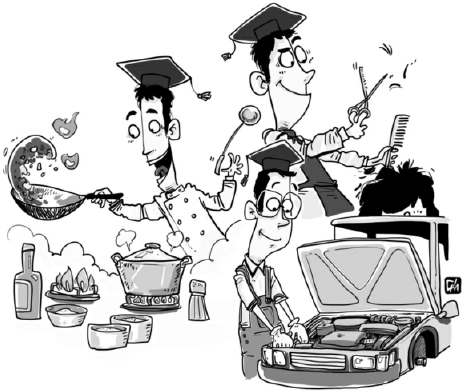Ideal education system offers options
Updated: 2016-04-08 08:00
By Xiong Bingqi(China Daily)
|
|||||||||
 |
|
Cai Meng/China Daily |
Some media reports say a youth returned to China after graduating from a university abroad and decided to receive technical training in Qingdao Technical College, East China's Shandong province, so that he could get a good job. The youth's decision has sparked a debate, with some people saying it proves studying abroad is worth less while others claim the quality of education students receive in China is better than that provided overseas.
The youth's decision, however, doesn't mean he failed to acquire knowledge abroad or regrets studying overseas. Before jumping to conclusions, we must understand the relationship between academic education and vocational education, and help students make informed academic choices.
Undergraduate students in overseas universities generally receive academic education, which in many cases may be non-vocational and non-career-oriented. Some students decide to complete post-graduate studies abroad after graduating from a college to give full play to their academic potential. But it is also normal for students to enroll in a vocational college after completing their undergraduate studies in a university.
Moreover, some courses in overseas universities actually offer vocational education, which allows students to receive vocational training during their post-graduate studies. But in China, academic education and vocational education are mixed together in higher education. Given that students studying in universities offering academic education courses are also required to have a high employment rate, educators have in recent years been training them in vocational skills.
Many people, including a large number of students, suppose basic theoretical courses are useless. Some people even want universities to reduce, if not altogether cancel, these foundation courses and offer more courses that will help graduates get jobs.
People tend to comp are university graduates with vocational school graduates in terms of their overall employment rate and hand-on skills, and generally conclude the former are not "successful". But such comparisons focus on universities' utilitarian orientation.
In fact, university students receiving vocational education after graduation should be regarded as those choosing another kind of education to further improve their knowledge and skills, not as "unsuccessful" people. And people have no reason to believe academic education is a failure.
Academic education and vocational education should be complementary. Academic education should focus on expanding students' knowledge and making them competent in their fields rather than helping them find jobs. So instead of looking at university graduates' employment rate, we should track their long-term career development to evaluate the effects of academic education.
There are also people who consider vocational education inferior to university education. But neither is superior or inferior. University education and vocational education have their own distinct characteristics. And if students receive academic education in foreign universities and return to China to enroll in vocational schools, one should analyze the requirements of the job market. But if students graduate from overseas vocational schools and return to receive further skills' training in China, their overseas study experience should be regarded as meaningless.
The problem is that people in China use the same criteria to evaluate all universities: diploma and employment. When public opinion emphasizes diploma, the universities become more popular because they are able to award high value diplomas. But when it comes to employment, people suppose higher education is less useful, because the employment rate of vocational school graduates is much higher.
Foreign education provides multiple choices for students, who can either receive vocational education after completing their academic education courses or receive vocational education before seeking admission to a formal university. Overseas universities offer a credit accumulation and transfer system to ensure students exercise their choice freely.
An ideal education system is one that enables students to make their own choice-academic education or vocational education, studying in China or abroad-according to their financial conditions, academic performances, interests, capabilities and career paths.
The author is vice-president of the 21st Century Education Research Institute.
Related Stories
Shandong University plans global innovation education 2016-04-07 09:42
University leader visits Pingtan for education cooperation 2016-04-01 17:06
The pros and cons of online education 2016-04-01 08:10
Online tuition craze shows need for fairer education 2016-03-31 07:52
Today's Top News
Inspectors to cover all of military
Britons embrace 'Super Thursday' elections
Campaign spreads Chinese cooking in the UK
Trump to aim all guns at Hillary Clinton
Labour set to take London after bitter campaign
Labour candidate favourite for London mayor
Fossil footprints bring dinosaurs to life
Buffett optimistic on China's economic transition
Hot Topics
Lunar probe , China growth forecasts, Emission rules get tougher, China seen through 'colored lens', International board,
Editor's Picks

|

|

|

|

|

|







